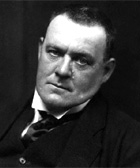A few years ago, while in China, I wrote a series of articles for a magazine regarding European table manners which has, surprisingly, just appeared from an old cardboard box. Knowing that some foreign students are occasionally reading this blog ... and because I would not like to lose it again, I have edited it into the following digest version.
Imagine that you have been invited to an important dinner. When I say, ‘important’, I mean that your boss or future father-in-law will be there.
You arrive, sit down, look in front of you and ... Knives! ... No chopsticks! But, even if you are a European you may think ... Wow, three forks, knives, spoons, and wine glasses! And no one to explain. Read on.
Unlike most Asian countries, Europeans order their dishes separately. Thus, you may start by ordering a salad — usually, salads are recognizable by the main ingredient in the name. However, one popular salad, Caesar Salad, cannot be identified by its name (unless you are from Rome) it comprises a lot of lettuce and some croutons (small pieces of toasted bread) and some bacon bits, and the vital Caesar salad dressing. Imagine my amazement at one restaurant when I ordered Caesar Salad to be asked my preferred dressing. With some amusement I replied, “Caesar please.” I became speechless when the reply was, “Sorry, we don’t have that one”!
Another unforgivable error, made by many Asian Western-styled restaurants, is the serving of various dishes in random order, or not allowing time between courses. I have often thought about refusing to even order the main course until I have finished the appetizer ... just to observe the nervous expression on their face.
Oh, three knives and forks? It is quite easy really; you simply select the cutlery from the outside inwards for each course. Wait staff may add a soup spoon on the right-hand side, if that is ordered. Similar actions may occur if you choose to have fish or steak, by substituting the standard knife with a fish or steak knife (Often, the standard knife is not removed). Finally, when you have finished eating the dish, place the cutlery together on the plate (A signal to a trained waiter to remove the plate).
Three wine glasses? It is true to say, these days, that serving a variety of wines with each course is unusual. Nevertheless, I believe that the practice can be an enrichment to a formal meal. Actually, there could be as many as four glasses. The first glass being a water goblet, then, continuing toward the right side there could be a champagne glass (if champagne should be served), then red or white wine glasses (according to courses served) and, finally, a sherry glass.
Ice water should be served when people sit down. The most important consideration is that the wine compliments the food ... and the palate of the people drinking it (If red wine is not to your taste, say so). And it is always worth considering the house wine at a good restaurant.
Generally speaking, dry white wine is served chilled in round-bowled stemmed glasses with fish. Red wine should be served at room temperature in less-rounded tulip-shaped glasses with red meats and game. Informally, red wine could be drunk throughout the meal.
Sadly, public education on this subject is unlikely to improve until restaurants employ a professional sommelier. For example, some people in Asia do not know the difference between liquor, liqueur and wine. Liquor is a strong alcoholic drink that has been distilled; for example, whiskey, vodka, rum, etc. It is never drunk with a European meal. Liqueur is a strong alcoholic spirit that has been sweetened and flavoured (with fruit, perhaps) and is usually drunk at the end of a meal; for example, Corvoisier or Harveys Bristol Cream.
It is worth mentioning that the soup bowl should not be lifted from the table, and making slurping noises is not considered an acceptable tribute to the chef (because he knows that it’s good).
Chicken legs should only be picked up by the fingers at KFC (Always popular in Asia because of the bones). Lamb chops should be eaten with a knife and fork — only if the end is covered by frilled paper may this be held in the left hand to assist cutting the meat from the bone. Shrimps should be eaten with one bite. Clams, oysters, or mussels, if served in the shell, may be held in the left hand and removed with a small fork, and eaten with one bite. Sauce or gravy may be soaked up by a small piece of bread (This would be a compliment to the chef).
Finally (and this may surprise some people), at the end of a formal meal, if one prefers decaffeinated coffee, it is polite to discretely inquire first, and decline if this is not so ... rather than asking for decaffeinated coffee.
Now, back to the restaurant reviews.















